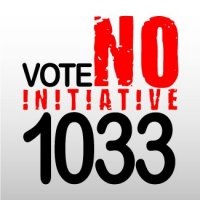There’s a local election coming up in just under a month, and much like any non-presidential election, turnout is expected to be sadly low. I persist in hoping that anyone reading this will take the time to vote — it’s especially easy around here, now that King County has gone to an all-mail balloting system. Just fill out the ballot, drop it in the mail or one of the many free ballot dropboxes, and you’re done. Quick and simple. So do it. There’s no good excuse not to.
There are two measures on the ballot this time around that deserve particular attention: R-71 and I-1033.
 Vote YES on R-71. Washington voters already approved a domestic partnership law, and R-71 (put on the ballot by people opposed to the domestic partnership law who hope to overturn it) is asking whether we should uphold that legislation. Simple answer: yes.
Vote YES on R-71. Washington voters already approved a domestic partnership law, and R-71 (put on the ballot by people opposed to the domestic partnership law who hope to overturn it) is asking whether we should uphold that legislation. Simple answer: yes.
There are more than 12,000 people in Washington state registered in domestic partnerships. Gay and lesbian families need domestic partnership laws to provide essential protections for their families. Families with children need the protections provided by domestic partnership laws, especially when a parent dies. Seniors need the protections provided by domestic partnership laws. For seniors, domestic partnerships mean that their hard-earned social security, military or pension benefits are not put at risk. Police officers and firefighters who risk their lives to protect our communities need domestic partnership laws if they are hurt or killed in the line of duty, so that their families are taken care of by their pension or workers’ compensation. By voting to Approve Referendum 71, you will vote to ensure that all families, in all parts of the state, should be treated fairly, with the same protections and responsibilities, especially in times of crisis.
While there’s a lot of support for approving R-71 among people I know (nearly all of my local Facebook contacts are ‘fans’ of the Approve R-71 Facebook page), a recent poll shows only a slim lead.
Referendum 71, which would uphold the state’s domestic-partnership bill if approved, is leading in the Seattle area but losing in less populous parts of the state, according to a poll conducted by Survey USA. Of the 548 voters surveyed in Washington, 45 percent said they would certainly approve the measure, 42 percent said they would reject it, and 13 percent were undecided.
A lead is good, but it could be a lot better than that. Spread the word.
 Vote NO on I-1033. The latest in Tim Eyman‘s series of proposals, I-1033 carries potentially disastrous repercussions should it pass…and recent polls show that it has a strong possibility of passing.
Vote NO on I-1033. The latest in Tim Eyman‘s series of proposals, I-1033 carries potentially disastrous repercussions should it pass…and recent polls show that it has a strong possibility of passing.
Tim Eyman’s Initiative 1033, which would lower taxes but ultimately devastate government budgets, would pass if voters had to decide today, the poll also shows. Of likely voters in the general election, 45 percent of respondents would certainly vote yes, 32 percent would vote no, and 22 percent were undecided.
As with most of Eyman’s proposals, they sound good on the surface, but don’t hold up well under close scrutiny — and, unfortunately, most people only bother with the surface. Here’s The Stranger’s look at what I-1033 would mean if it passes:
Tim Eyman’s new initiative, which will be on your ballot in November, seems simple enough. It would essentially limit the amount of money the government can collect from taxpayers based on how much it collected the previous year, adjusted for inflation and population growth. Any surplus the state collects would go toward reducing property taxes. Eyman says Initiative 1033 would stabilize the legislature’s “fiscal roller coaster, overextending themselves in good times—creating unsustainable budgets—which led to slashing during bad times.”
So what could go wrong?
If passed by voters, the measure would lock Washington into its current budget—the worst budget the state has had in decades, owing to the recession—and prevent the budget from expanding when the economy improves. So the state at its leanest—like right now, with a budget requiring the state to lay off roughly 3,000 teachers and cut basic health services for 40,000 people—would become the most robust the state could ever be. In addition, the gap between costs and revenue would steadily grow, because costs for services and shifts in demographics (like more students in schools and old people in nursing homes) outpace inflation and population growth.
Indeed, even the early forecasts of I-1033 show potentially devastating impacts on the state’s budget for education, health care, and vaccines. As a result, class sizes could grow, increasing numbers of poor and elderly people would be kicked off state-funded health programs, and response to natural disasters and disease outbreaks would be minimal because the state couldn’t run surpluses to pay for them.
Sadly, while the Approve R-71 campaign is and has been going strong (in one admittedly somewhat questionable metric, their Facebook page has almost 15,000 ‘fans’), the No on I-1033 campaign has yet to achieve nearly the level of consciousness (their Facebook page is at 2,260 ‘fans’), and without more people realizing just what the consequences of passing I-1033 will be, the slick language of the initiative stands a strong chance of pushing it through, and crippling Washington’s budget for the foreseeable future.
That’s it, then. Slightly less than a month. Two important measures, both of which could use more support. Yes on R-71. No on I-1033. Don’t forget to vote.
